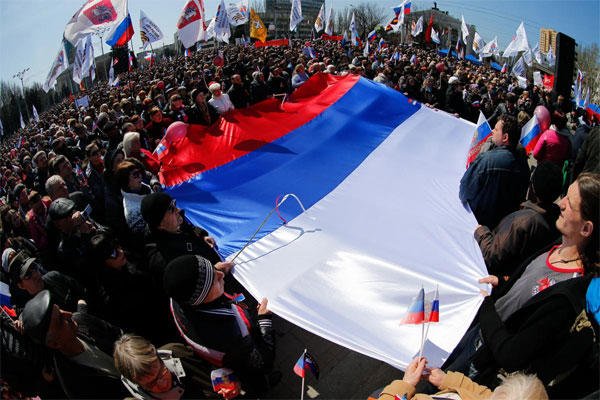This spring, the Army published the Russia New Generation Warfare Study, a detailed look at current and future Russian warfare technology, informed in part by surreptitious visits to the front lines in Ukraine.
But one significant Russian threat doesn't involve advanced technology, and it's having a creeping influence on civilian circles as well as operational spheres, military experts said Wednesday at the annual meeting of the Association of the United States Army in Washington, D.C.
While the "little green men" surreptitiously deployed by Russia during the 2014 annexation of Crimea are perhaps the best example of Russian tactical deception, a widespread Russian information warfare operation that permeates even social media and American political discussion is having its own effect, they said.
Peter W. Singer, a strategist at the New America Foundation, said Russian efforts to infiltrate social media to sow misinformation and discord were having an effect, with polling showing Americans were less likely to believe their vote for president would be counted fairly and that they were less certain about whether to view Russian President Vladimir Putin as friend or foe.
"It's now playing out in the presidential campaign," Singer said. "[Russian] people either trying to appear as fans of a particular political candidate and get more attention, or they appear as fans of a political candidate and do something awful. The goal in all of this is not to make people love Russia, to love Putin. It is, simply put, classic information warfare to disrupt and create distrust."
For the military, this aggressive, multi-platform information warfare can delay decision-making as planners work to discern facts amid widespread deception.
"On the information side, it really does pose a tactical-operational-strategic conundrum for us," said Brig. Gen. Peter Jones, commandant of the United States Army Infantry School at Fort Benning, Georgia. "As [U.S. Army Europe Commander Lt. Gen. Frederick Benjamin "Ben"] Hodges would say, he has a problem with speed of recognition."
Ambiguity of Russian actions and motives can also influence or thwart higher-level policy decisions, Jones said.
"It affects our ability, what we're calling speed of assembly, not just in terms of conventional forces, but political will to do something with them," he said. "So the information environment is internal to the Russian population and truly, given the billions of dollars they're spending, is targeted to provide ambiguity and dissension."
The experts did not provide a solution to the problem, but Singer suggested a start would be getting wise to the scope of the problem, on the civilian and strategic side.
"We've got to be more resilient to it," he said. "The best way to avoid being manipulated is to understand that you are being manipulated."
-- Hope Hodge Seck can be reached at hope.seck@military.com. Follow her on Twitter at@HopeSeck.































